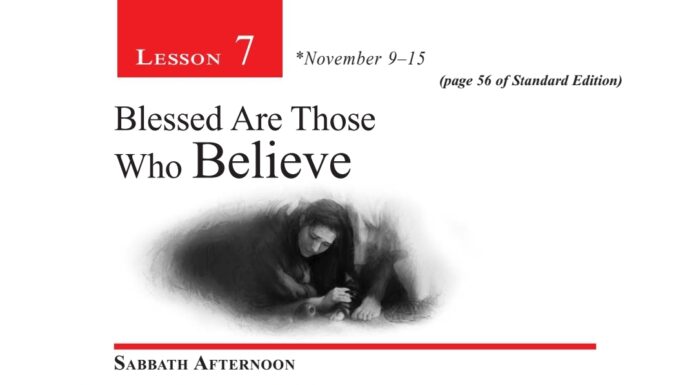Lesson Seven: BLESSED ARE THOSE WHO BELIEVE
Jesus spoke with confidence and certainty about His identity as the fulfilment of the promised Messiah. This week, we are looking at those who witnessed the same on His behalf and why their witness is so important to Jesus.
Memory Text: John 20:29
“Jesus said to him, ‘Thomas, because you have seen Me, you have believed. Blessed are those who have not seen and yet have believed.'”
SABBATH: Throughout the Gospel of John, we find testimonies of diverse people with different backgrounds, beliefs and experiences, all testifying to who Jesus is. These include John the Baptist, Philip, Nathanael, the Samaritan woman, Peter, Martha, a blind man, Pontius Pilate to the Jews and Thomas. Furthermore, we see why some of these people testified as they did to the identity of Jesus.
(READ John 1:36, 41,45,49; 4:29,42; 6:68; 11:27, 9:25; 19:6,14; 20:28)
SUNDAY: Jesus was not afraid to declare who He was, even witnesses of Him who were long gone such as Abraham. The ram offered in the place of Isaac represented the Son of God, who was to be sacrificed in our stead. The promise of all nations being blessed through Him came through the Messiah being born through his lineage. Being the father of the Jewish nation, he also was the father of those who respond to God in faith, evidenced by his willingness to sacrifice his son, Isaac, who was the son of promise, further pointing to the plan of salvation.
(READ John 8:56, Genesis 12:3, Matthew 1:1, Genesis 22, Hebrews 11:8,17-19)
MONDAY: Six days before the Passover, Simon, who had been healed from leprosy, hosted a feast in appreciation for what Jesus has done for him. Upon savings of a year’s wages, Mary brings a gift of a very expensive perfume, showing gratitude for what Jesus did for her. She intended it to be used someday for the burial of Jesus. Knowing what is in the hearts of people, Jesus notices this gesture aside the rebukes from the disciples and as He went down into the darkness of His great trial, He carried with Him the memory of that deed, an earnest of the love what would be from His redeemed ones forever.
(READ John 12:1-3, 6-8; 2:24&25; 13:11)
TUESDAY: John, the Gospel writer, calls on many witnesses to testify that Jesus was Christ and calls upon Pilate, a Roman governor and judge, who tried Jesus. Upon the hour of crucifixion, Pilate heard Jesus declaring His purpose into this world which was to bear witness to the Truth and everyone who is of the truth as one who listens to His voice. Pilate had the Truth standing infront of him, He testifies of Christ’s innocence three times, but he nevertheless condemned Jesus to death upon allowing to be bullied by the crowd of people.
(READ John 18:38; 19:4-22)
WEDNESDAY: While Jesus Christ’s disciples were together in a room because of fear, He appeared to them after His resurrection. Given the fact that Thomas was not around at that time, he doubted the reports of Jesus’ resurrection from other disciples. Thomas dictated the conditions of his faith as believing after seeing and touching Jesus’ nail prints. This approach to faith in Jesus draws a similarity with what Nicodemus, the Samaritan woman, and the crowd asked Him. However, our faith must rest upon evidence, not demonstration. God gives us sufficient evidence about His existence, character, truthfulness, and His Word upon which to base our faith.
(READ John 20:19-31; 3:4; 4:11; 6:30)
THURSDAY: The point of the Gospel of John is the conclusion that, despite the many other signs that Jesus did which are not recorded in that Gospel, with that which is written, one may believe that Jesus is the Christ, the Son of God, and that by believing, one may have life in His name. As much as we were not in the times when Jesus was on earth, we have many more reasons to believe in Him because we have seen so much of what Jesus and other Bible writers predicted, come true. It is only by reading the Scriptures under the influence of the Holy Spirit that we accept Jesus as the Saviour of the world.
Furthermore, our personal relationship with God can have a story to tell as witness of Him.
(READ John 20:30&31; Matthew 24:2, 6-8,14; John 3:4; 4:11; 6:30 )
FRIDAY:Jesus accepted Thomas’ acknowledgement as he cried “My Lord and my God,” but He gently reproved his unbelief by stating many more who have not seen Him and yet believed, as blessed. The faith of Thomas would have been more pleasing to Christ if he had been willing to believe in the testimony of his brethren. Many more, who, like Thomas, wait for all causes of doubt to be removed, will never realise their desire but are rather more confirmed in unbelief.
(READ “The Test of Faith” pages 145-155 in Patriarchs and Prophets and “In Pilate’s Judgement Hall” pages 723-740 in The Desire of Ages.)
CAPTIONS:
SUNDAY: Harking back to Abraham
MONDAY: The witness of Mary
TUESDAY: The unwitting witness of Pilate
WEDNESDAY: The witness of Thomas
THURSDAY: Our witness of Jesus
DISCUSSION QUESTIONS:
- What was the essential difference in the expressions of faith by Abraham and by Thomas? What can we learn from their stories?
- Look at the prophecies of Daniel 2 and 7. Though those in the time of Jesus had these two chapters, what great advantage do we have today that they did not have back then, in terms of seeing those prophecies fulfilled and thus having even more reasons to believe?



